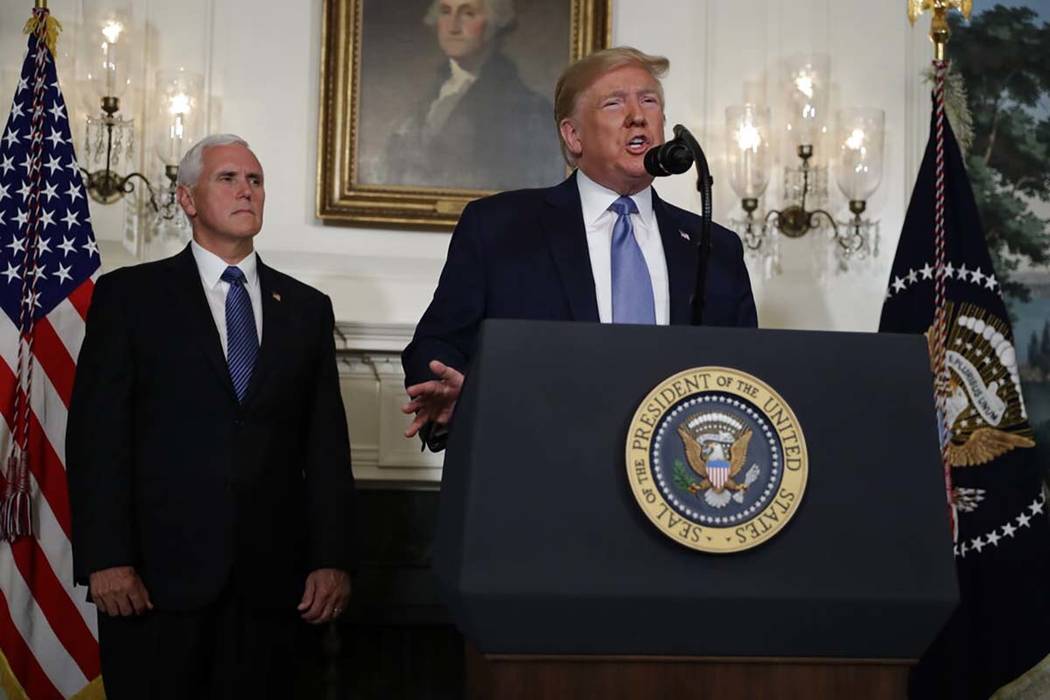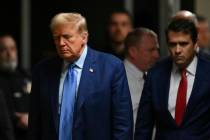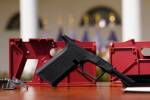Trump speaks to nation after 2 mass shootings
WASHINGTON — President Donald Trump called Monday for the nation to “condemn racism, bigotry and white supremacy,” faulted “violent video games” and urged passage of laws that would prevent dangerous individuals from having guns in the wake of two weekend mass shootings.
“We will stand by their side forever,” Trump said of the 31 victims of shootings in Texas and Ohio. “We will never forget.”
Once again, Trump was called to address a brutal reality that has dogged his presidency even before the Oct. 1, 2017, Las Vegas shooting that left 58 people dead, through the shooting at a Parkland, Florida, high school that left 17 children and educators dead, to this weekend during which mass shootings took 22 lives in El Paso, Texas, Saturday morning, and then nine more in Dayton, Ohio, before dawn Sunday.
Trump’s calls for Americans to reject hate and bigotry — “Hatred warps the mind, ravages the heart, and devours the soul” — fell flat with many on the left who argue that his rhetoric has stoked racial animus.
“We cannot begin to address the rising epidemic of white nationalist terrorism until President Donald Trump faces up to his own role, disowns his previous rhetoric — in particular his demonizing of immigrants, similar language of which was at the heart of too many of these terrorist attacks — and stops stoking hatred as part of his strategy to energize his base,” Neera Tanden, president of the Center for American Progress, said in a statement.
But Trump found support from Andy Pollack, whose daughter Meadow died in the Parkland shooting.
“We all know that he’s against bigotry and white supremacists,” Pollack told the Review-Journal. Trump is “the furthest thing” from a racist, Pollack added. “He shouldn’t have to explain himself.”
Trump urges bipartisanship
While the president called for bipartisanship, he did not join Democrats who support a ban on assault weapons, like the AR-15-style rifle used in the Ohio shooting, and the AK-47-style assault rifle used in Texas.
“Hatred pulls the trigger,” Trump offered, “not the gun.”
Trump did advocate for “red flag laws,” that would allow authorities to seize guns from dangerous individuals through “rapid due process,” but made no reference to the Bipartisan Background Checks Act of 2019, which would require background checks for private gun transfers. The Democratic House passed the measure in February but it has not been brought to the Senate floor.
“Our gun laws aren’t working,” Rep. Dina Titus,D-Nev., responded. “If President Trump were serious about addressing the epidemic of gun violence, he would ask (Senate Majority Leaders) Mitch McConnell to advance the bills we’ve already passed in the House to expand background checks.”
McConnell’s office chose not to respond Monday.
It is not clear that new laws would have prevented either the Texas or Ohio shooting. Authorities have said the guns used in both shootings were purchased legally.
“We cannot allow ourselves to feel powerless. We can and will stop that evil contagion,” Trump said in his remarks in the White House. He went through a list of actions that he argued might stanch the violence — better identification of potential shooters, working with social media platforms to identify potential killers like “the monster in the Parkland high school in Florida,” addressing violence in video games, changing mental health laws and imposing the death penalty on mass shooters and conducting executions without years of delay.
“We have asked the FBI to identify all further resources they need to investigate and disrupt hate crimes and domestic terrorism — whatever they need,” the president said.
Trump also proposed confining dangerously mentally ill individuals involuntarily — but as with the other ideas he floated, the White House offered no specific language.
Gun measures opposed
Gun Owners of America senior vice president Erich Pratt released a statement that opposed universal background checks, assault-weapons bans and red flag laws, which “are incompatible with actual due process and allow for the confiscation of firearms from innocent Americans.”
Pratt instead called for Congress to pass House Resolution 38, which would allow individuals licensed to carry a concealed handgun in one state to possess a concealed handgun in another state, as well as House Resolution 3200, which repeals provisions of federal law prohibiting the possession or discharge of a firearm in a school zone.
Trump apparently decided against a notion he tweeted Monday morning — marrying proposals to enhance background checks for gun purchases and “desperately needed immigration reform.”
“We must have something good, if not GREAT, come out of these two tragic events!” he tweeted.
“No,” Rep. Don Beyer, D-Va., tweeted in response. “You tell your senior white supremacy adviser Stephen Miller that we will not respond to this racist killer’s mass shooting with more attacks on immigrants. The US Congress does not reward acts of terror.”
A majority of Americans have consistently said they support stronger gun laws, but proposals have stalled repeatedly in Congress.
In March, a poll conducted by The Associated Press-NORC Center for Public Affairs Research found a majority of Americans favor stricter gun laws. It found that 67 percent of Americans support making U.S. gun laws stricter, while 22 percent say they should be left as they are and 10 percent think they should be made less strict. The survey was conducted both before and after a mass shooting at two mosques in New Zealand.
Contact Debra J. Saunders at dsaunders@reviewjournal.com or 202-662-7391. Follow @DebraJSaunders on Twitter. The Associated Press contributed to this report.





























